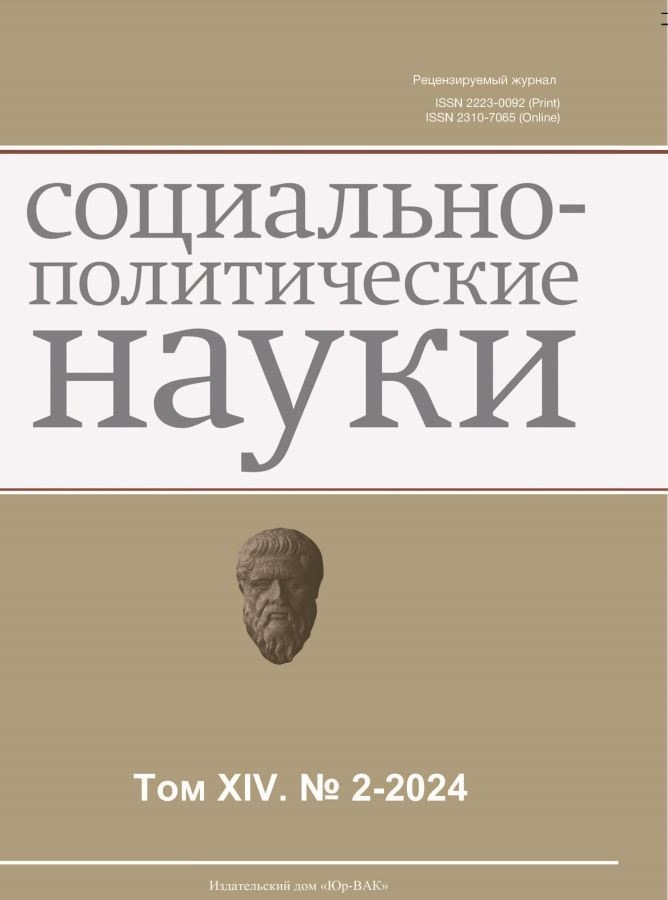Family Memory as a Factor in the Formation of Civic Identity of Youth. Sociological Analysis
- Autores: Bogatova O.A.1, Dadaeva T.M.1
-
Afiliações:
- Ogarev Mordovian State University
- Edição: Volume 14, Nº 2 (2024)
- Páginas: 166-176
- Seção: Social Structure Social Institutions and Processes
- URL: https://journals.eco-vector.com/2223-0092/article/view/633874
- DOI: https://doi.org/10.33693/2223-0092-2024-14-2-166-176
- EDN: https://elibrary.ru/HOJCII
- ID: 633874
Citar
Texto integral
Resumo
The article analyzes and summarizes the results of a qualitative sociological study of the family memory of young people. generation of “centennials”, using the example of students of Mordovian State University, implemented by the method of in-depth interviews in order to identify the main characteristics of the family memory of young people in the context of the formation of their civic identity. Regular interaction of the family with wider communities of memory, as well as institutional “places of memory”, in modern Russia has been established, including the exchange of information and material evidence of memory through digital and traditional archives, museums, local history publications, the media, etc., construction “assemblage points” between significant people and events in the history of the family, on the one hand, and the country, on the other, through which the historical past of the country is included in the family narrative, and the family’s past in the public memorial culture. The similarities and differences between the basic structure of informants’ family memory narratives and the official narrative of Russian memory policy are shown. It was revealed that the family memory of “centennials” mediates the individual’s connection not with individual social groups, formed in the form of mnemonic communities, but with the community of memory of an indefinite set of people, which can be correlated with the category of “people” as a state-civil community.
Texto integral
Sobre autores
Olga Bogatova
Ogarev Mordovian State University
Autor responsável pela correspondência
Email: bogatovaoa@gmail.com
ORCID ID: 0000-0001-5877-7910
Scopus Author ID: 6505697029
Researcher ID: AAZ-1398-2021
Dr. Sci. (Sociol.), Associate Professor; Professor, Department of Sociology and Social Work
Rússia, SaranskTatiana Dadaeva
Ogarev Mordovian State University
Email: dadaeva13@mail.ru
ORCID ID: 0000-0002-9749-9244
Scopus Author ID: 8591653500
Researcher ID: AAN-4148-2021
Dr. Sci. (Sociol.), Associate Professor; Professor, Department of Sociology and Social Work
Rússia, SaranskBibliografia
- Barash R.E. Family history and family memory in Russia of the 2020s. Politeia. 2023. No. 4 (111). Pp. 141–162. (In Rus.) doi: 10.30570/2078-5089-2023-111-4-141-162.
- Dadaeva T.M., Motkin V.N. Historical memory in Finno-Ugric families of Mordovians and Udmurts (experience in analyzing of family histories). Finno-Ugric World. 2019. Vol. 11. No. 4. Pp. 414–436. (In Rus.) doi: 10.15507/2076-2577.011.2019.04.414-436.
- Historical consciousness of Russians: Assessments of the past, memory, symbols (experience of sociological measurement). M.K. Gorshkov (ed.). Moscow: Ves mir, 2022. 248 p. doi: 10.55604/9785777709042.
- Merridale C. Night of stone: Death and memory in twentieth century Russia. Moscow: AST$ Corpus, 2019. 512 p.
- Miller A.I. Growth of the significance of institutional factor in politics of memory – causes and implications. Politeia. 2019. No. 3 (94). Pp. 87–102. (In Rus.) doi: 10.30570/2078-5089-2019-94-3-87-102.
- Omelchenko E.L., Andreeva Ju.V. What remains in the family history: The memory of “the Soviet” in the conversation of three generations. Sociological Studies. 2017. No. 11. Pp. 147–156. (In Rus.) doi: 10.7868/S0132162517110162.
- Memory on the Web: A digital turn in memory studies. A.F. Pavlovsky, A.I. Miller (eds.). St. Petersburg: EUSP Press, 2023. 352 p.
- The politics of memory in contemporary Russia and in countries of Eastern Europe. A.I. Miller, D.V. Efremenko (eds.). St. Petersburg: EUSP Press, 2020, 632 p. https://www.elibrary.ru/item.asp?id=42430136.
- Mikhailenok О.М., Mitrofanova A.V., Bogatova О.А. et al. The past that would not go: Cultural trauma, historical memory and identity. Monograph. А.V. Mitrofanova (ed.). Мoscow: FCTAS RAS, 2023. 216 p. doi: 10.19181/monogr.978-5-89697-4109.2023.
- Symbolic aspects of the politics of memory in modern Russia and Eastern Europe. V.V. Lapin, A.I. Miller (eds.). St. Petersburg: EUSP Press, 2021.
- Shirokalova G.S. Communicative memory: Studying family stories (materials of sociological workshop at the university). Sociological Studies. 2018. No. 5. Pp. 145–153. (In Rus.) doi: 10.7868/S0132162518050136.
- Halbwachs M. On collective memory. Moscow: Novoe izdatelstvo; 2007. 348 p.
- Alexander J.C., Eyerman R., Giesen B. et al. Cultural trauma and collective identity. New York: University of California Press, 2004. 314 p.
- Berger S., Scalmer S., Wicke C. (eds.) Remembering the modern world. Activism and memory. London; New York: Routledge, 2021. 321 p. URL. https://lccn.loc.gov/2020057619.
- Connerton P. Seven types of forgetting. Memory Studies. 2008. Vol. 1. No. 1. Pp. 59–71. doi: 10.1177/1750698007083889.
- Erll A., Rigney A. (eds.) Mediation, remediation, and the dynamics of cultural memory. Berlin; New York: Walter de Gruyter, 2009. 256 p.
- Fridman O. Memory activism and digital practices after conflict: Unwanted memories. Amsterdam: Amsterdam University Press, 2022. 235 p. doi: 10.5117/9789463723466.
- Keightley E., Pickering M. Research methods for memory studies. Edinburgh: Edinburgh University Press, 2013. 256 p. doi: 10.1515/9780748683475.
- Khlevnyuk D. Victim-heroes in collective memory: Surviving Soviet repressions heroically. Memory Studies. 2021. Vol. 16. Iss. 2. Pp. 1–14. doi: 10.1177/1750698021995992.
- Koleva D. Memory archipelago of the communist past. Public narratives and personal recollections. Cham: Springer, 2022. 296 p. doi: 10.1007/978-3-031-04658-2.
- Landsberg A. Engaging the past: Mass culture and the production of historical knowledge. New York: Columbia University Press, 2015. 213 p. doi: 10.7312/land16574.
- Lewis S., Olick J.K., Wawrzyniak J., Pakier M. Regions of memory, Palgrave Macmillan memory studies. Cham: Palgrave Macmillan, 2022. 244 p. doi: 10.1007/978-3-030-93705-8_5.
- McGlynn J., Jones O.T. Researching memory and identity in Russia and Eastern Europe. Interdisciplinary methodologies. Cham: Palgrave Macmillan, 2022. 218 p. doi: 10.1007/978-3-030-99914-8.
- Olick J.K. The Politics of regret: On collective memory and historical responsibility. New York: Routledge, 2007. 229 p.
- Van de Putte T. Outsourcing the European Past. An interscalar study of memory and morality. Cham: Palgrave Macmillan, 2024. 156 p. doi: 10.1007/978-3-031-54132-2.
Arquivos suplementares









